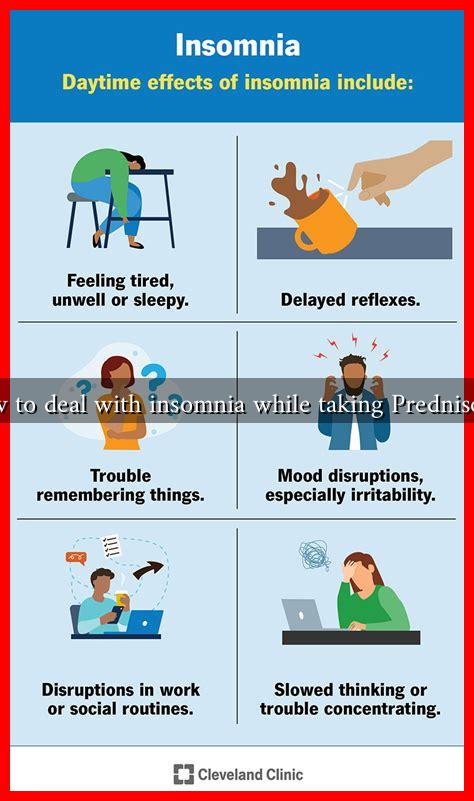-
Table of Contents
- How to Deal with Insomnia While Taking Prednisone
- Understanding the Connection Between Prednisone and Insomnia
- Practical Strategies for Managing Insomnia
- 1. Establish a Consistent Sleep Routine
- 2. Create a Sleep-Inducing Environment
- 3. Limit Stimulants and Heavy Meals
- 4. Incorporate Relaxation Techniques
- 5. Consult Your Healthcare Provider
- Case Studies and Real-Life Examples
- Conclusion
How to Deal with Insomnia While Taking Prednisone
Insomnia is a common side effect for many individuals taking Prednisone, a corticosteroid medication often prescribed for conditions such as asthma, arthritis, and autoimmune diseases. While Prednisone is effective in reducing inflammation and suppressing the immune system, it can disrupt sleep patterns, leading to a cycle of fatigue and discomfort. This article explores strategies to manage insomnia while on Prednisone, providing insights and practical tips for better sleep.
Understanding the Connection Between Prednisone and Insomnia
Prednisone can affect sleep in several ways:
- Stimulation of the Central Nervous System: Prednisone can increase alertness and energy levels, making it difficult to wind down at night.
- Hormonal Changes: The medication can alter cortisol levels, which play a crucial role in regulating sleep-wake cycles.
- Physical Discomfort: Conditions treated by Prednisone, such as arthritis, may cause pain that further disrupts sleep.
According to a study published in the Journal of Clinical Sleep Medicine, nearly 50% of patients on corticosteroids report sleep disturbances. Understanding these factors is the first step in managing insomnia effectively.
Practical Strategies for Managing Insomnia
Here are several strategies that can help mitigate insomnia while taking Prednisone:
1. Establish a Consistent Sleep Routine
Creating a regular sleep schedule can help regulate your body’s internal clock. Aim to go to bed and wake up at the same time every day, even on weekends. This consistency can improve sleep quality over time.
2. Create a Sleep-Inducing Environment
Your bedroom should be conducive to sleep. Consider the following:
- Keep the room dark and cool.
- Use comfortable bedding.
- Minimize noise with earplugs or white noise machines.
3. Limit Stimulants and Heavy Meals
Avoid caffeine and nicotine, especially in the hours leading up to bedtime. Additionally, try to refrain from heavy meals close to bedtime, as they can cause discomfort and disrupt sleep.
4. Incorporate Relaxation Techniques
Engaging in relaxation techniques can help calm your mind and prepare your body for sleep. Consider:
- Meditation or mindfulness exercises.
- Gentle yoga or stretching.
- Deep breathing exercises.
5. Consult Your Healthcare Provider
If insomnia persists, it’s essential to discuss your symptoms with your healthcare provider. They may adjust your Prednisone dosage or suggest alternative medications to help manage your condition without compromising your sleep.
Case Studies and Real-Life Examples
Many patients have successfully managed insomnia while on Prednisone by implementing these strategies. For instance, a 45-year-old woman with rheumatoid arthritis reported significant improvements in her sleep quality after establishing a consistent bedtime routine and practicing relaxation techniques. She noted that her sleep duration increased from 4 hours to 7 hours per night within a few weeks.
Another case involved a 60-year-old man who struggled with insomnia due to Prednisone use for COPD. After consulting his doctor, he was prescribed a lower dose and encouraged to avoid caffeine in the afternoon. He experienced a marked improvement in his sleep quality, allowing him to feel more rested and alert during the day.
Conclusion
Dealing with insomnia while taking Prednisone can be challenging, but it is manageable with the right strategies. Establishing a consistent sleep routine, creating a conducive sleep environment, limiting stimulants, incorporating relaxation techniques, and consulting with healthcare providers are all effective ways to improve sleep quality. By taking proactive steps, individuals can mitigate the impact of Prednisone on their sleep and enhance their overall well-being.
For more information on managing sleep disturbances, consider visiting the National Sleep Foundation for additional resources and support.




